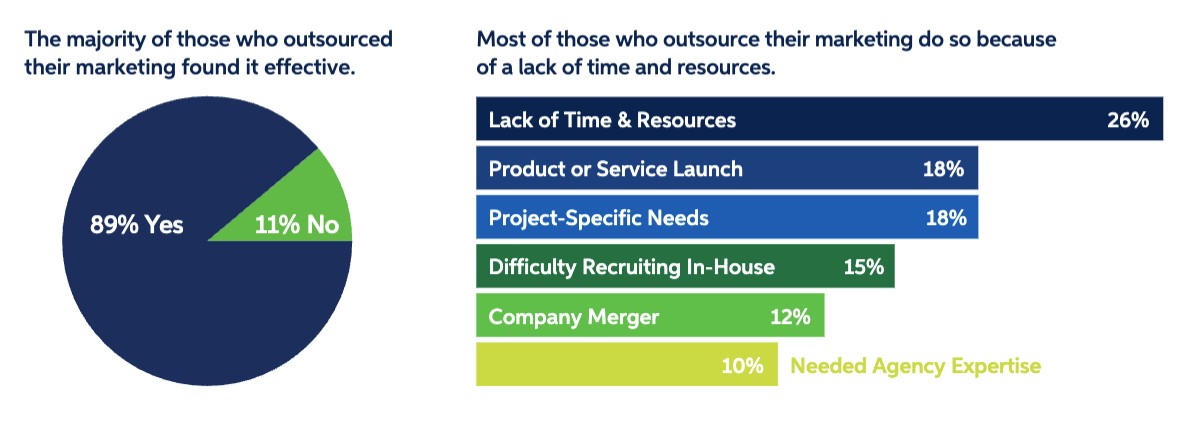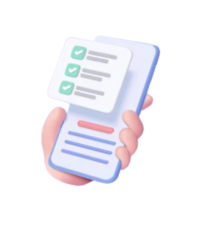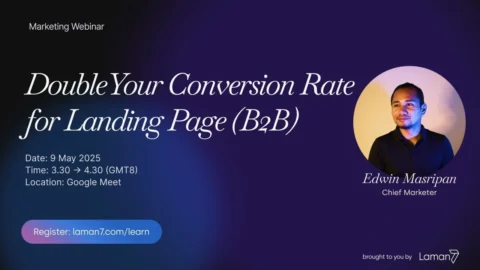Marketing as a Service (MaaS) is a contemporary marketing approach that provides businesses with comprehensive, outsourced marketing solutions. In this model, businesses leverage the expertise and services of external marketing professionals or agencies on a flexible, subscription-based, or on-demand basis.
Based on the Sagefrog report in 2023 from 2400 responses in B2B Industry, The winning Marketing model combines in-house and outsourced.

Challenge Businesses Faces in Marketing
Why do companies opt for Marketing as a service?
- Lack of Time & Resources (26%)
- Product or Service Launch (18%)
- Project-Specific Needs (18%)
- Difficulty Recruiting In-House (15%)
- Company Merger (12%)
- Needed Agency Expertise (10%)

Most B2B companies’ sales departments are also intricately woven into the fabric of the marketing team. While this integration can foster collaboration, it often results in stretched resources and demands a delicate balance between crucial activities such as follow-up calls and proactive client prospecting.
This dual role places significant pressure on sales professionals navigating the fine line between nurturing existing relationships and actively seeking new business opportunities. The challenge lies in managing the intricacies of current client needs and identifying and pursuing potential leads to fuel future growth.
As sales representatives are pulled in multiple directions, the risk of inefficiencies and missed opportunities looms. The need to maintain a strong presence in the immediate and future market landscapes is evident, yet time and resources are finite.
To address this challenge, B2B companies are increasingly exploring strategies to streamline and optimize their sales and marketing functions. This may involve leveraging technology to automate routine tasks, implementing robust customer relationship management (CRM) systems, or even considering the possibility of dedicated teams for specific aspects of the sales and marketing process.
Marketing as a Service vs Other Models
This table provides a concise comparison of Marketing as a Service (MaaS) with the traditional in-house model and the outsourced agency model across various key features. Businesses can use this comparison to evaluate the suitability of each model based on their specific needs and objectives.
| Feature | Marketing as a Service (MaaS) | Traditional In-House Model | Outsourced Agency Model |
|---|---|---|---|
| Flexibility | Bring diverse and specialized skills to the table, staying current with industry trends. | Limited flexibility, fixed team size often leading to challenges during fluctuating demands. | Moderate flexibility, but may involve renegotiating contracts for adjustments. |
| Specialized Expertise | Bring diverse and specialized skills to stay current with industry trends. | In-house teams may lack the breadth of expertise or struggle to stay updated on the latest trends. | It offers high flexibility, allowing businesses to scale up or down based on needs. |
| Cost-Efficiency | Generally more cost-effective as businesses pay for specific services, avoiding unnecessary overhead. | Can be costly with ongoing expenses like salaries, benefits, and training for an in-house team. | Cost structures may vary, and businesses may incur additional fees for specific services. |
| Data-Driven Approach | Relies heavily on data analytics for real-time adjustments and optimization. | Agencies often use data but may face challenges obtaining comprehensive insights without direct access to internal systems. | Agencies may specialize in digital marketing but not fully integrate with the company’s internal processes. |
| Digital Marketing Focus | Well-suited for navigating the digital landscape with expertise in online channels. | Strategies are crafted in-house but may lack external perspectives and diversity. | Agencies provide external expertise but may not understand the company’s specific needs in-depth. |
| Customized Strategies | Tailors strategies to the unique goals and challenges of each client. | Adapting to the rapidly evolving digital space may require additional training or hiring. | Agencies provide customized strategies, but understanding the company’s nuances may take time. |
| Long-Term Partnerships | Emphasizes building enduring partnerships, becoming an integral part of the client’s team. | Internal teams naturally foster long-term relationships but may face challenges staying updated with external industry trends. | Agencies aim for long-term relationships, but client turnover can affect the continuity of the partnership. |
Key features of Marketing as a Service include:
1. Scalability
MaaS allows businesses to scale their marketing efforts up or down based on their current needs. This flexibility is particularly beneficial for companies experiencing fluctuating demands or those looking to test new marketing initiatives without committing to long-term contracts.
2. Specialized Expertise
MaaS providers often bring diverse skills and expertise to the table. These professionals stay abreast of the latest marketing trends, technologies, and strategies, ensuring that businesses benefit from the field’s most effective and current practices.
3. Data-Driven Approach
MaaS relies heavily on data analytics and insights to inform marketing strategies. By leveraging advanced tools and technologies, MaaS providers can analyze consumer behaviour, track the performance of marketing campaigns, and make real-time adjustments to optimize results.
4. Cost-Efficiency
Compared to maintaining an in-house marketing team with associated overhead costs, MaaS offers a more cost-effective solution. Businesses pay for the specific services they require, avoiding unnecessary expenses and ensuring a more streamlined budget allocation.
5. Digital Marketing Focus
MaaS is particularly well-suited for navigating the digital landscape. With a strong emphasis on online channels such as social media, search engine optimization (SEO), content marketing, and digital advertising, MaaS helps businesses establish and enhance their digital presence.
6. Customized Strategies
MaaS providers tailor their marketing strategies to each client’s unique goals and challenges. Whether the objective is to increase brand awareness, generate leads, or drive sales, MaaS delivers customized solutions aligned with the business’s specific needs.
7. Long-Term Partnerships
MaaS is not just about providing services; it’s about building enduring partnerships. MaaS providers work closely with their clients, becoming integral members of their marketing teams. This collaborative approach fosters long-term relationships focused on achieving mutual success.
Risk with Marketing as a Service
Marketing as a Service (MaaS) brings efficiency but involves risks:
- Dependency on external providers could impact initiatives if relationships sour.
- Confidentiality and security concerns may arise when sharing sensitive business information.
- Limited control over day-to-day execution could result in suboptimal outcomes.
- Communication challenges between the business and the service provider may lead to misunderstandings.
- Quality of work can vary, necessitating careful assessment of the provider’s ability to meet agreed-upon standards and adapt to changes.
Mitigation strategies include thorough due diligence, clear contracts, and regular performance evaluations to ensure a successful MaaS partnership.
Summary
In summary, Marketing as a Service represents a shift from traditional, in-house marketing models to a more flexible, specialized, and data-driven externalized approach. Businesses can harness the benefits of MaaS to stay agile, competitive, and strategically aligned with the rapidly evolving landscape of modern marketing.
Next Step
If creating marketing assets proves challenging, onboarding new customers feels cumbersome, or maintaining campaigns yields minimal success, it’s crucial to pause and reassess your strategies.
Laman7 is an established MaaS B2B Marketing Agency that focus on delivering three parts of marketing, “Core” for the fundamentals, “Catalyst” as to shift from stranger to client and “Constant” to reel in new prospects to the business.






